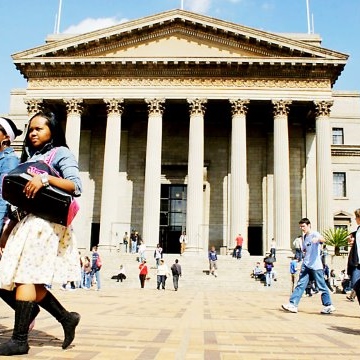
News

Is the pressure for distinctions to get into university worth it?
JORDAN MOSHE
University of the Witwatersrand vice-chancellor Adam Habib says: “With 37 000 students enrolled at the institution, Wits has more students than it ever did in the past. We receive over 570 000 applications each year, meaning that we are oversubscribed by more than 100 times. Over 9 000 students apply for the 2 000 spaces we have available in the first-year medicine programme.”
Habib explains the criteria, using medicine as an example. “People with As aren’t necessarily unique. Everyone else has As. Unfortunately, this is the only neutral yardstick available to us to make impartial decisions. However, we try to assess applicants’ academic performance holistically.
“Starting with English and Maths, we look at the top five marks attained by an applicant, which accumulatively constitute 50% of the entry score. The remaining 50% is based on the score attained in the National Benchmarking Test (NBT). This is an independent assessment in academic literacy and mathematics for first-year applicants into higher education institutions, written at designated venues prior to submitting applications. Also, a student needs at least a 50 Admission Point Score (APS) – a system which allocates point values to the levels of achievement obtained for matric subjects – to apply to the programme. Community service hours and participation in extramurals do not impact applications, although I think they should be taken into account.”
Habib adds that the requirements for entry into other sought-after programmes, such as accounting and engineering, are similar. “Although they have no NBT requirement, these programmes tend to favour applicants with substantive results and require at least a 35 APS total for most of them. These fields are considered more secure for finding jobs, and so we set a rather high standard.”
Despite these academic standards, Habib says students should not fixate on their distinctions. “Distinctions are important for getting into university, but they don’t determine success at all. The focus of university study is unlike that of matric, and students need to learn to adjust their expectations and their approach to study.”
Habib stresses the importance of all career and study paths, including other university degrees and even skills acquired elsewhere. “Success in matric doesn’t need to be followed by a technical degree. Students don’t need to be a doctor, no matter what their parents tell them. There is a shortage of skills in vocational training positions, and the truth is that a qualified electrician can earn more than a doctor in some cases.
“University education is not merely technical. It moulds you as a human being and a citizen. What you learn assists you in engaging with the world and finding your place in it. Vocational qualifications, the social sciences, and other Humanities degrees are necessary to help us solve the big problems of today. Parents and even educators have a heavy bias in favour of the sciences, and this needs to change. We need to reimagine what it means to work in the 21st century.”
Media liaison manager at the University of Cape Town, Elijah Moholola, highlights its key criteria for applicants. “Distinctions are good to achieve, but individual distinctions are less important than strong overall academic performance. Admission to university is largely driven by performance at school, and students must be acutely aware of their strengths and limitations. Selecting a suitable programme of study is the key part of admission to university.”
Despite the importance of academic achievement in applications, Habib expresses frustration at the extent to which matriculants obsess over university studies. “Most matrics don’t go to university, with only 29% getting access to tertiary education. This idea of asking a 17-year-old student what they want to do with their life is not fair at all. Education is about learning, and you need to achieve a balance between study for the sake of knowledge and for the sake of a career. Matric distinctions only carry you so far. Students need to progress beyond them and move into the world as citizens of a cosmopolitan society.”
Echoing these sentiments, principals of the Jewish day schools expressed how the bigger picture is often forgotten where matric results are concerned.
“Matric in South Africa is blown out of all proportion,” says Rabbi Steven Krawitz of Hirsch Lyons High School, “with a greater emphasis placed on distinctions and a diminishing focus on developing a work ethic and getting a good, rounded education.
“It is not only about the matric results and the content plus skills mastered, but also the development of a work ethic and a well-adjusted personality, ready to engage with the challenges the world offers.”
Denese Bloch of Yeshiva College feels the same. “An emphasis on distinctions often serve as a handicap, giving rise to arrogance and a belief that students know exactly what to expect at university. The model of learning is completely different, and students can only be prepared for the change if they don’t put too much emphasis on the matric results. The work ethic of high school provides a platform for this preparation but needs to be developed in university. This can only happen if the distinctions are left behind and a step forward is taken.”




